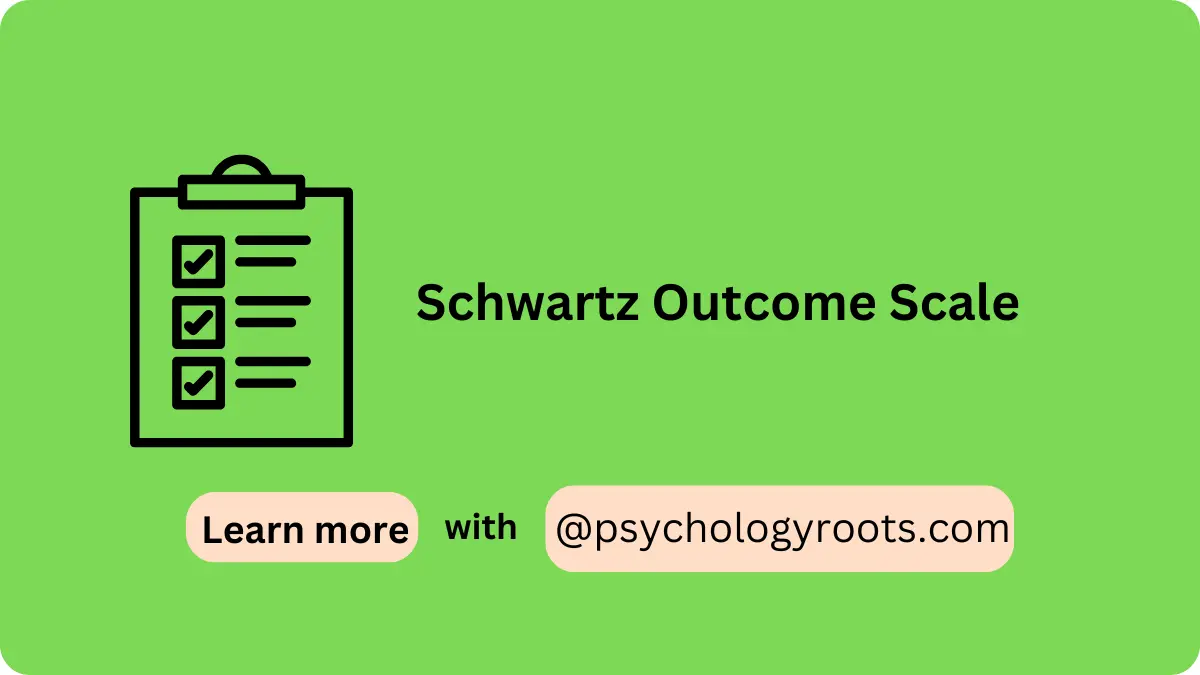Table of Contents
Schwartz Outcome Scale
Here in this post, we are sharing the “Schwartz Outcome Scale”. You can read psychometric and Author information. We have thousands of Scales and questionnaires in our collection (See Scales and Questionnaires). You can demand us any scale and questionnaires related to psychology through our community, and we will provide you with a short time. Keep visiting Psychology Roots.
About Schwartz Outcome Scale
Scale Name
Schwartz Outcome Scale
Author Details
Michael A. Schwartz
Translation Availability
English

Background/Description
The Schwartz Outcome Scale (SOS-10), originally developed by Michael A. Schwartz and colleagues, is a 10-item self-report questionnaire designed to measure general psychological well-being in adults, particularly in clinical settings. It assesses overall functioning and quality of life, focusing on emotional, relational, and existential aspects without being tied to specific theoretical orientations. This atheoretical approach allows its use by practitioners from various disciplines (e.g., psychiatrists, social workers, psychologists) and orientations (e.g., CBT, psychodynamic).
The SOS-10 is normed on diverse samples, including inpatient, outpatient, college counseling, and non-patient community and college populations. Items are rated on a 7-point Likert scale (0 = “Never” to 6 = “All or nearly all of the time”), with higher scores indicating better psychological well-being (range: 0–60). It has been correlated with longer outcome measures like the Outcome Questionnaire-45 (OQ-45) and validated against scales such as Beck’s Hopelessness Scale, PANAS, and Personality Assessment Inventory. The SOS-10 is used in clinical psychology, psychiatry, and research to monitor therapy progress, with administration recommended before each session.
Administration, Scoring and Interpretation
- Obtain the scale from authorized sources, such as Blais et al. (1999) or Young et al. (2003) publications, ensuring ethical use permissions.
- Explain the purpose to respondents, noting that it assesses general well-being to support therapy, emphasizing anonymity and using clear, non-judgmental language.
- Provide instructions, asking respondents to rate their agreement with statements about their psychological state over the past week, using the 7-point Likert scale.
- Approximate time for completion is 2-3 minutes, given the 10-item format.
- Administer in a clinical or research setting, using paper or digital formats, ensuring a private environment. Oral administration may be used for respondents with reading difficulties.
Reliability and Validity
The SOS-10 has excellent internal consistency, with Cronbach’s alpha ranging from 0.90 to 0.96 across studies. Test-retest reliability is not reported, but stability is inferred to be high based on similar well-being measures (r ≈ 0.80-0.90 over weeks). Convergent validity is supported by a strong negative correlation with the OQ-45 (r = -0.84), and correlations with related constructs such as Beck’s Hopelessness Scale (negative), PANAS (positive subscales positive, negative subscales negative), and Personality Assessment Inventory (various subscales in predicted directions).
Discriminant validity is evidenced by weaker correlations with unrelated constructs. Criterion validity is demonstrated by its ability to differentiate clinical (inpatient/outpatient) from non-clinical samples, with norms: non-patients (45.3), outpatients (33.28), inpatients (25.57). Factor analyses are not detailed, but the scale’s unidimensional focus on well-being supports construct validity. The reliable change index is 8, indicating meaningful therapeutic progress.
Available Versions
10-Items
Reference
Blais, M. A., Lenderking, W. R., Baer, L., deLorell, A., Peets, K., Leahy, L., & Burns, C. (1999). Development and initial validation of a brief mental health outcome measure. Journal of personality assessment, 73(3), 359-373.
Lambert, M. J., Christensen, E. R., & DeJulio, S. S. (1983). The assessment of psychotherapy outcome. (No Title).
Important Link
Scale File:
Frequently Asked Questions
What does the Schwartz Outcome Scale measure?
It measures general psychological well-being and functioning.
Who can use the scale?
Practitioners from various disciplines assessing clients in therapy.
How long does the scale take to complete?
It takes about 2-3 minutes.
Is the scale specific to certain groups?
It targets adults in clinical or non-clinical settings.
Can the scale inform interventions?
Yes, it monitors therapeutic progress with a reliable change index of 8.
Disclaimer
Please note that Psychology Roots does not have the right to grant permission for the use of any psychological scales or assessments listed on its website. To use any scale or assessment, you must obtain permission directly from the author or translator of the tool. Psychology Roots provides information about various tools and their administration procedures, but it is your responsibility to obtain proper permissions before using any scale or assessment. If you need further information about an author’s contact details, please submit a query to the Psychology Roots team.
Help Us Improve This Article
Have you discovered an inaccuracy? We put out great effort to give accurate and scientifically trustworthy information to our readers. Please notify us if you discover any typographical or grammatical errors.
Make a comment. We acknowledge and appreciate your efforts.
Share With Us
If you have any scale or any material related to psychology kindly share it with us at psychologyroots@gmail.com. We help others on behalf of you.